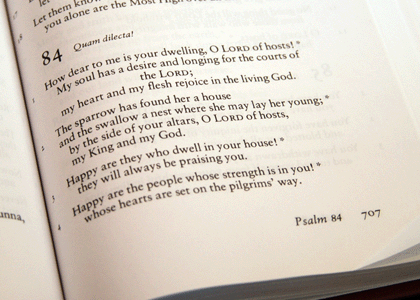The Temptation Not To Trust
I was blessed by Steve’s sermon on our First Sunday of Lent. One point particularly caught my attention. While describing how Christ’s temptations were a reprise of those perpetrated upon Adam and Eve, they have this underlying theme: “you will be better off if you are in control.” This is Satan’s ruse to get Adam and Eve under his control, of course, and he made the same attempt with Christ. What was so insightful from Steve was how Christ’s resistance to this temptation was not to counter with control or “power-play”! Jesus could have called upon a host of angels to help Him.
Rather, the way Christ counters is to remain IN the human vulnerability, which He had assumed when He became flesh. He doesn’t combat a temptation to take control with control. He remains in-trust, in the face of acute vulnerability. He does not move to self-assertion.
The truth of our human existence is vulnerability. There is an existential lesson written into the human experience: we depend upon food, we depend upon justice, and life is a gift (it is not ours to self-determine). When these vulnerabilities are pricked with the pain of deprivation, we want to run things ourselves. Satan goes after that proclivity.
Jesus shows us that we can remain in trust, because He’s already traveled that path. He’s even paved the way for us, and left provisions throughout its course.
It is hard to be in the wilderness, that place where the “wild things are,” where we are sorely reminded that we are not in control. But, it’s a good place to be, IF we will stay with Him in trust. The heart of trust, which we cultivate in the desert, becomes a hidden treasure. In that sense, trust is like a “Trust Fund”, if you will. When put into play, it is like a downpayment of a great heavenly treasure, a preliminary provision of full inheritance to come. It keeps us going. As we see in Christ’s response to Satan, God’s words are food enough for a heart of trust.
Trust is also an action that has a point, a journey with a destiny. We are actually walking a path that leads to the promised land. Israel illustrates this “walking way”: learning dependence upon God through the lesson of Manna. When the lesson finally sinks in, God’s chosen people were able to enter the land that was promised to them. Wonderfully, Jerusalem of old is just a prefiguring of the Paradise that Jesus is leading us to. Trust follows Him through the wilderness, believing He knows the way, even though the way is hard.
Satan would have us believe that we can wrest control of the Principal that funds our trust fund, that we can create a short-cut in the wilderness. Believing that lie is to exchange gold for tin, or mistake a mirage for a fertile valley. It provides nothing of substance and it leads nowhere. That’s because the lesson here, again, is about control. God, who certainy IS all powerful, does not choose power to redeem those who are made in His image. He uses love and trust.
It’s worth meditating on that great early hymn to Christ, which Paul records in Philippians 2: He did not consider equality with God as something to be grasped (i.e. “controlled”), and Jesus actually was in the form of God! Somehow, it is “Divine Form” to not grasp! The surprising truth of scripture, revealed in Christ, is that the divine life (which we always try to steal) has a non-grasping, non-controlling, core. Divine nature is the opposite of robbery, it is generosity! It pours-out rather than grasping and controlling. It is a contradiction to go for control in the face of testing, if we truly want to enjoy God’s best.
I guess the question for me in Lent is what will I do with my “trust fund”? I’d like to keep using my “faith allowance,” and trusting Christ with the Principal.
Recommended Posts

Summer Services and Fellowship
June 14, 2023

Upcoming Events
February 02, 2022

Upcoming Events
November 23, 2021
